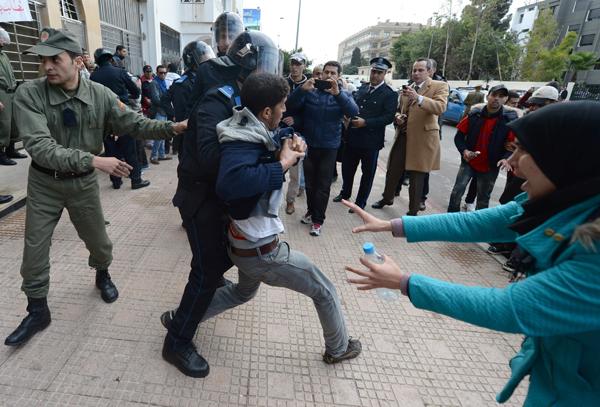RABAT — Moroccan authorities banned a sit-in on Saturday by hundreds of judges who want greater independence for the judiciary, deploying dozens of riot police to central Rabat and closing off streets around the justice ministry.
Nearly three years after protests inspired by the Arab Spring prompted King Mohamed to undertake limited reforms and propelled an Islamist party to power, his government is now re-asserting its authority in what rights groups describe as a step backwards.
Since independence in 1956, Morocco’s justice system has been seen by critics as largely under the control of the North African country’s powerful monarchy.
The reforms introduced by the king in 2011 did award the judiciary more autonomy, but the opposition says it is still not fully independent.
The sit-in in Rabat was called by the Judges’ Club, an independent organisation formed by Moroccan magistrates during the 2011 protests. It was to be only their second demonstration, the first having passed peacefully in 2012.
Morocco’s interior ministry announced late on Friday that it had banned the protest.
President of the Judges’ Club Yassine Mkhelli told protesters gathered at a building belonging to the justice ministry that he was informed of the ban on Saturday morning.
“[The decision] is proof that we are right,” Mkhelli said.
Moroccan Justice Minister Mustapha Ramid on Wednesday warned judges against demonstrating, saying they would be breaking the law if they protested in their robes.
“Judges can always go to the king, as he is the guarantor of the independence of the judiciary, if they feel threatened,” he said.
The Islamists of the Justice and Development party, which came to power after early elections held to quell protests in 2011, promising to fight corruption, have made reform of the judiciary one of its priorities.
Last September, the government unveiled a reform plan which includes more resources and training for judges, prosecutors and lawyers, and the establishment of a high council of the judiciary, as promised in the new constitution.
But the Judges organisation was excluded from talks to discuss these reforms, and Mkhelli said some of proposals were a step back for the powers and status of judges.
“We want organic laws that guarantees the independence of the judiciary from executive and legislative powers and from social and political lobbies,” he told Reuters.

















